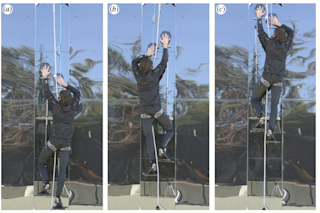Three frames from a video (below) showing a 70 kg climber ascending a 3.7 m vertical glass surface using a synthetic adhesion system with degressive load-sharing and gecko-inspired adhesives.Even though I still really want a jetpack, I'm pretty stoked about this new technology developed by scientists at Stanford University. Inspired by the incredible climbing ability of geckos, they developed a synthetic material that allows full-grown adults to scale glass skyscrapers, just like Spiderman! Be sure to check out the awesome video below!Human climbing with efficiently scaled gecko-inspired dry adhesives. "Since the discovery of the mechanism of adhesion in geckos, many synthetic dry adhesives have been developed with desirable gecko-like properties such as reusability, directionality, self-cleaning ability, rough surface adhesion and high adhesive stress. However, fully exploiting these adhesives in practical applications at different length scales requires efficient scaling (i.e. with little loss in adhesion as area grows). Just as natural gecko adhesives have been used as a benchmark for synthetic materials, so can gecko adhesion systems provide a baseline for scaling efficiency. In the tokay gecko (Gekko gecko), a scaling power law has been reported relating the maximum shear stress σmax to the area A: σmax ∝ A(-1/4). We present a mechanical concept which improves upon the gecko's non-uniform load-sharing and results in a nearly even load distribution over multiple patches of gecko-inspired adhesive. We created a synthetic adhesion system incorporating this concept which shows efficient scaling across four orders of magnitude of area, yielding an improved scaling power law: σmax ∝ A(-1/50). Furthermore, we found that the synthetic adhesion system does not fail catastrophically when a simulated failure is induced on a portion of the adhesive. In a practical demonstration, the synthetic adhesion system enabled a 70 kg human to climb vertical glass with 140 cm(2) of adhesive per hand."
Related content: Pretending to have superpowers actually changes you. NCBI ROFL: Bionic insect cyborgs: 90% insect, 10% robot, 100% terrifying. NCBI ROFL: Study shows reading Twilight makes you more vampiric.














